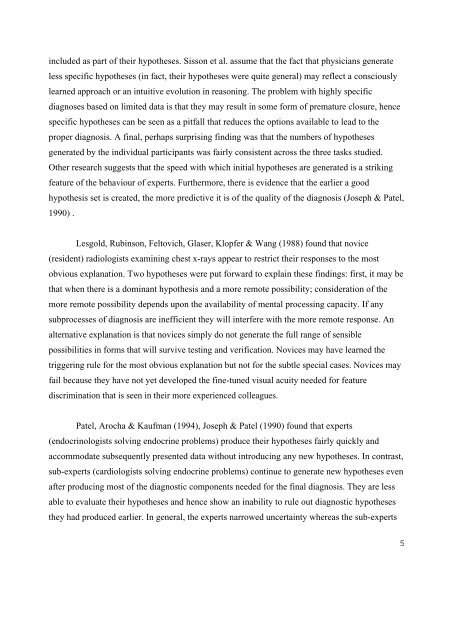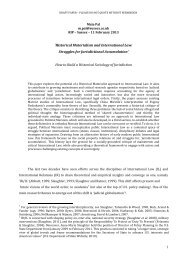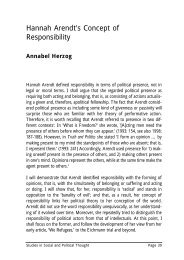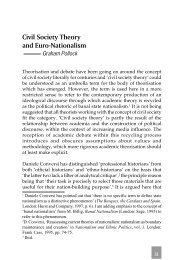Expert/Novice differences in Diagnostic Medical Cognition - A ...
Expert/Novice differences in Diagnostic Medical Cognition - A ...
Expert/Novice differences in Diagnostic Medical Cognition - A ...
Create successful ePaper yourself
Turn your PDF publications into a flip-book with our unique Google optimized e-Paper software.
<strong>in</strong>cluded as part of their hypotheses. Sisson et al. assume that the fact that physicians generate<br />
less specific hypotheses (<strong>in</strong> fact, their hypotheses were quite general) may reflect a consciously<br />
learned approach or an <strong>in</strong>tuitive evolution <strong>in</strong> reason<strong>in</strong>g. The problem with highly specific<br />
diagnoses based on limited data is that they may result <strong>in</strong> some form of premature closure, hence<br />
specific hypotheses can be seen as a pitfall that reduces the options available to lead to the<br />
proper diagnosis. A f<strong>in</strong>al, perhaps surpris<strong>in</strong>g f<strong>in</strong>d<strong>in</strong>g was that the numbers of hypotheses<br />
generated by the <strong>in</strong>dividual participants was fairly consistent across the three tasks studied.<br />
Other research suggests that the speed with which <strong>in</strong>itial hypotheses are generated is a strik<strong>in</strong>g<br />
feature of the behaviour of experts. Furthermore, there is evidence that the earlier a good<br />
hypothesis set is created, the more predictive it is of the quality of the diagnosis (Joseph & Patel,<br />
1990) .<br />
Lesgold, Rub<strong>in</strong>son, Feltovich, Glaser, Klopfer & Wang (1988) found that novice<br />
(resident) radiologists exam<strong>in</strong><strong>in</strong>g chest x-rays appear to restrict their responses to the most<br />
obvious explanation. Two hypotheses were put forward to expla<strong>in</strong> these f<strong>in</strong>d<strong>in</strong>gs: first, it may be<br />
that when there is a dom<strong>in</strong>ant hypothesis and a more remote possibility; consideration of the<br />
more remote possibility depends upon the availability of mental process<strong>in</strong>g capacity. If any<br />
subprocesses of diagnosis are <strong>in</strong>efficient they will <strong>in</strong>terfere with the more remote response. An<br />
alternative explanation is that novices simply do not generate the full range of sensible<br />
possibilities <strong>in</strong> forms that will survive test<strong>in</strong>g and verification. <strong>Novice</strong>s may have learned the<br />
trigger<strong>in</strong>g rule for the most obvious explanation but not for the subtle special cases. <strong>Novice</strong>s may<br />
fail because they have not yet developed the f<strong>in</strong>e-tuned visual acuity needed for feature<br />
discrim<strong>in</strong>ation that is seen <strong>in</strong> their more experienced colleagues.<br />
Patel, Arocha & Kaufman (1994), Joseph & Patel (1990) found that experts<br />
(endocr<strong>in</strong>ologists solv<strong>in</strong>g endocr<strong>in</strong>e problems) produce their hypotheses fairly quickly and<br />
accommodate subsequently presented data without <strong>in</strong>troduc<strong>in</strong>g any new hypotheses. In contrast,<br />
sub-experts (cardiologists solv<strong>in</strong>g endocr<strong>in</strong>e problems) cont<strong>in</strong>ue to generate new hypotheses even<br />
after produc<strong>in</strong>g most of the diagnostic components needed for the f<strong>in</strong>al diagnosis. They are less<br />
able to evaluate their hypotheses and hence show an <strong>in</strong>ability to rule out diagnostic hypotheses<br />
they had produced earlier. In general, the experts narrowed uncerta<strong>in</strong>ty whereas the sub-experts<br />
5
















